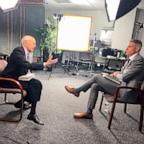Bush Bashing May Not Win White House
Bush unpopularity creates opening for Dems in '08 but they could overplay hand.
May 22, 2007 — -- Political consultants in all parties often say the most powerful political words in the English language are "time for a change." Those in power hate the phrase; those seeking power love it.
With President Bush's popularity stagnating at low levels, whoever wins the GOP presidential nomination may need to put some distance between himself and Bush.
Veteran Democratic pollster Peter Hart met with a focus group comprised of independents, Democrats and Republicans in Towson, Md., Monday night.
He found that only about one in four wanted the next president to continue in the same direction as Bush. Hart said this election appears to be different from most.
In the past, said Hart, voters wanted a specific agenda. This time, he said, the one big issue is the Iraq War and how to end it.
But beyond that he found they care most, at least for the moment, not about detailed positions on issues such as health care or education, but "about bringing a mood, a spirit, a different outlook."
Still Hart and other political pros say Democrats should not be overconfident.
They point to the 1976 race as a reminder that, although a candidate can be damaged through association with an unpopular president, Americans will take a second look before voting.
In that election, President Gerald Ford came surprisingly close to winning despite several millstones around his neck: the disgraced President Richard Nixon had chosen him for vice president, Ford granted Nixon a pardon and the national economy was in trouble.
Despite all that, Ford won almost 50 percent of the vote because many Americans liked and admired him.
His press secretary, Ron Nessen, said voters realized that Ford was not Nixon, that he did not lust for power.
Nessen, now at the Brookings Institution, said, "It's character that always emerges and defines the presidency."
Hart also found that voters are concerned about competency, especially when it comes to national security.




